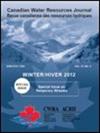地下水抽吸对河流流量和温度影响的实证检验——以Chemainus河为例
IF 0.9
4区 环境科学与生态学
Q3 WATER RESOURCES
引用次数: 0
摘要
从抽水井中抽取地下水会减少水力连接地表水的流量和水位,从而影响水生社区和其他用户的水权。在2016年夏季低流量期进行了4次水泵试验,测量地下水抽水对Chemainus河地表水流量和温度的影响。抽水对地表流量的影响是利用四个指标来估计的,这些指标是基于距离地下水井340米处的一个水文测量仪的实测流量和预测流量之间的差异。差异作为回归模型的残差进行了估计,回归模型将该水位的流量与井上游1.3公里的水位的流量联系起来。利用位于水井下游340米和1.4公里处的日最高水温和日平均水温来评估抽水对地表水温度的影响。当水泵开启和关闭时,抽水对河水流量的影响是可测量的。在所有测试中测量到的效果的一致性以及在测试内部和测试之间缺乏可识别的趋势表明,在更广泛的时间段内,抽水的平均效果相当于所有比较前后的平均值,估计为9.9升/秒±12.1升/秒,或测试时河流流量的5.5%。抽取地下水并没有引起水温的明显变化。结果表明,与泵试验相关的水温变化在幅度或空间尺度上都小于实施试验设计的检测限。这个案例研究提供了一个量化抽水对水流和温度的影响的例子,这是《水可持续性法案》对地下水开采许可的要求。我们建议这种方法可以在其他地方用于量化地下水抽取的影响。本文章由计算机程序翻译,如有差异,请以英文原文为准。
An empirical test of groundwater pumping effects on river flow and temperature: Chemainus River case study
Abstract Groundwater abstraction from pumping wells can reduce the flows and water levels of hydraulically connected surface waters, which can affect aquatic communities and water rights of other users. Four pump tests were implemented in the 2016 summer low-flow period to measure groundwater pumping effects to Chemainus River surface water flow and temperature. The effect of pumping on surface flow was estimated using four metrics based on differences between measured and predicted flow at a hydrometric gauge located 340 m from the groundwater wells. Differences were estimated as residuals from a regression model relating flow at this gauge to flow at a gauge 1.3 km upstream of the wells. The effect of pumping on surface water temperature was assessed using daily maximum and daily average water temperature at gauges located 340 m and 1.4 km downstream of the wells. An effect of pumping on river flow was measurable when the pumps were turned on and shut off. The consistency of measured effects across all tests and the absence of discernable trends within and across tests indicate that the average effect of pumping across a broader period is equivalent to the average of all before and after comparisons, which was estimated as 9.9 L/s ± 12.1 L/s, or 5.5% of river discharge at the time of the tests. Groundwater pumping did not result in a detectable shift in water temperature. The results indicate that changes in water temperature in relation to the pump tests were smaller in magnitude or spatial scale than the detection limits of the implemented experimental design. This case study provides an example of quantification of pumping effects on stream flow and temperature, as required by the Water Sustainability Act for licensing of groundwater abstraction. We suggest this approach could be used elsewhere to quantify effects of groundwater abstraction.
求助全文
通过发布文献求助,成功后即可免费获取论文全文。
去求助
来源期刊

Canadian Water Resources Journal
WATER RESOURCES-
CiteScore
2.90
自引率
5.90%
发文量
17
审稿时长
>12 weeks
期刊介绍:
The Canadian Water Resources Journal accepts manuscripts in English or French and publishes abstracts in both official languages. Preference is given to manuscripts focusing on science and policy aspects of Canadian water management. Specifically, manuscripts should stimulate public awareness and understanding of Canada''s water resources, encourage recognition of the high priority of water as a resource, and provide new or increased knowledge on some aspect of Canada''s water.
The Canadian Water Resources Journal was first published in the fall of 1976 and it has grown in stature to be recognized as a quality and important publication in the water resources field.
 求助内容:
求助内容: 应助结果提醒方式:
应助结果提醒方式:


